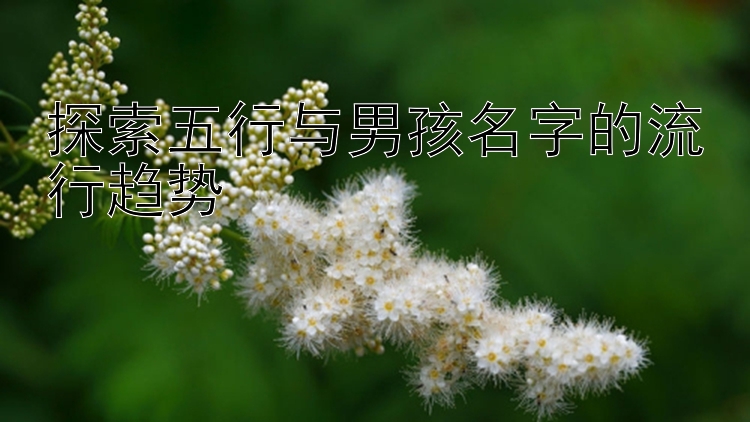在东方文化中,尤其是中国的传统哲学体系里,"五行"是一个核心概念,它指的是金、木、水、火、土五种元素。这五种元素 are not only believed to be the fundamental building blocks of the universe but also play a significant role in determining an individual's personality, health, and destiny. As such, many parents consider incorporating elements of the five phases into their children's names when choosing a name for their newborn baby boys. Let's delve deeper into how these concepts influence popular naming trends:
1. The Symbolic Meaning Behind Each Element
- 金 (Jīn) - Gold/Metal: Representing strength, clarity, and nobility, names with this element often suggest a child will grow up to be firm, decisive, and high-minded. Examples include Jinyang (Golden Sun) or Jinhao (Majestic Metal).
- 木 (Mù) - Wood: This element is associated with growth, vitality, and creativity. Names like Muyi (One With Nature) or Mutong (Timber Dragon) might reflect hopes that the child will have a strong connection to nature and a creative spirit.
- 水 (Shuǐ) - Water: Symbolizing adaptability, fluidity, and intuitiveness, water names may imply intelligence and emotional depth. Names like Shuiyue (Water Moon) or Shuilin (Stream Forest) evoke images of tranquility and harmony.
- 火 (Huo) - Fire: Representing passion, enthusiasm, and energy, fire names suggest a vibrant character full of life force. Examples include Huoran (Rising Flame) or Huaixiang (Warm Breeze).
- 土 (Tǔ) - Earth: Linked to stability, reliability, and practicality, earth names connote solid foundations and down-to-earth personalities. Naming choices might include Tudi (Earth Child) or Gengtou (Steel Foundation).
2. Balancing Yin and Yang in Boy Names
In addition to considering the symbolic meaning behind each element, Chinese parents also take into account the concept of yin and yang—the complementary forces that make up all things in the universe. A balance between these two energies is sought after, so names that harmonize both aspects are preferred. For instance, a boy named "Yangming" implies brightness and clarity, while "Yiming" suggests serenity and calmness. The combination creates a balanced name that reflects both active and passive qualities.
3. Modern Interpretations of Traditional Elements
While traditional Chinese names often feature characters directly related to the five elements, modern interpretations can be more subtle. Parents might choose names that sound pleasant and meaningful without being overtly tied to the elements themselves. However, they still seek names that resonate with the positive attributes associated with the elements. For example, the name "Xuan" means "mysterious" and could be seen as a reflection of the hidden power of water; similarly, "Liang" represents brightness, which echoes the illuminating quality of metal.
4. International Influences on Name Choices
As globalization continues, international influences increasingly shape naming practices around the world. Many families now opt for Westernized names or hybrid names that blend Eastern and Western aesthetics. These names may retain some cultural significance from the five elements while adopting sounds and styles that appeal to a broader audience. Such names often strike a delicate balance between tradition and modernity, reflecting the diverse and dynamic society we live in today.
In conclusion, the selection of a name for a newborn boy involves careful consideration of various factors, including those derived from ancient philosophical systems like the five elements and yin and yang. While traditional names remain popular, there is a growing trend towards combining old wisdom with contemporary sensibilities, resulting in unique and meaningful monikers that carry forward the rich heritage of East Asian culture.